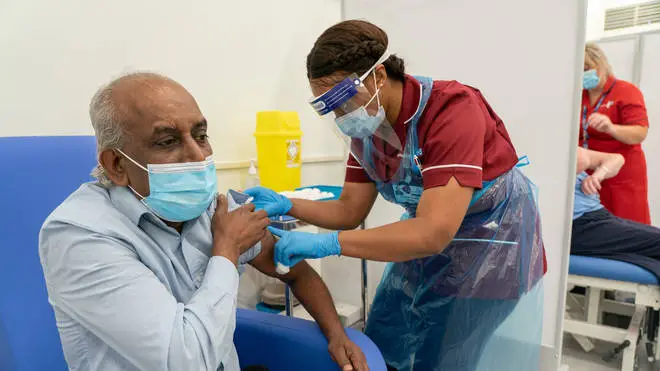
Ali Miraj 6pm - 9pm
28 April 2021, 00:45 | Updated: 28 April 2021, 19:17

One dose of a Covid-19 vaccine can cut transmission of the virus by up to a half, a new study from Public Health England (PHE) has shown.
The research found that those given a dose of either the Pfizer or AstraZeneca vaccines - but still became infected at least three weeks later - were between 38 and 49 per cent less likely to pass coronavirus on to those living with them, compared to people who were not inoculated.
PHE's findings give more hope that the global pandemic can be overcome if vaccinated individuals are less likely to transmit the virus.
It also found the vaccine offered protection from around 14 days after being administered, with similar levels being offered across age groups.
Previous research has also revealed both the BioNTech and Oxford drugs are highly effective at preventing people from getting ill or ending up being admitted to hospital.
Teams will now investigate whether two shots of a vaccine can slash transmission of the virus even further.
Read more: Quarter of UK adults have now received two doses of Covid vaccine
Read more: Coronavirus vaccines now being offered to people aged 42 and over

Matt Hancock: Jab bookings open to those age 42 and over in England
Similar results could be expected in places where the risk of transmission is similar to the home, such as shared accommodation and prisons, PHE said.
The study included data from January and February, when the Kent Covid variant was dominant in the UK.
Health and Social Care Secretary Matt Hancock said: "This is terrific news - we already know vaccines save lives and this study is the most comprehensive real-world data showing they also cut transmission of this deadly virus.
"It further reinforces that vaccines are the best way out of this pandemic as they protect you and they may prevent you from unknowingly infecting someone in your household.
"I urge everybody to get their vaccines as soon as they are eligible and make sure you get your second dose for the strongest possible protection.
"This is a huge national effort and we will beat the virus together."
Read more: New photos show huge scale of UK's 'heroic' vaccine effort
Read more: Over half of UK adult population now had at least one Covid jab

Pfizer, Moderna and AstraZeneca: The Coronavirus Vaccines Explained
The study, which has yet to be peer-reviewed, included over 57,000 people living in 24,000 households who were the contacts of a vaccinated person.
They were compared with nearly one million contacts of people who had not had a vaccine.
Contacts were defined as secondary cases of coronavirus if they tested positive two to 14 days after the initial household case.
Most of the people in the study were under the age of 60.
Dr Mary Ramsay, head of immunisation at PHE, said: "Vaccines are vital in helping us return to a normal way of life.
"Not only do vaccines reduce the severity of illness and prevent hundreds of deaths every day, we now see they also have an additional impact on reducing the chance of passing Covid-19 on to others.

JCVI member believes we will be able to mix Covid vaccines
"I encourage anyone who is offered a vaccine to take it as soon as possible.
"While these findings are very encouraging, even if you have been vaccinated, it is really important that you continue to act like you have the virus, practise good hand hygiene and follow social distancing guidance."
Dr Peter English, a retired consultant in communicable disease control, said the study was robust and the authors may have in fact underestimated the effect of vaccines on transmission.
He added: "These findings are really important. They add to our reasons to hope that the vaccines will truly add to herd immunity.
"The evidence was already mounting that vaccination will prevent people from becoming infected (and if they aren't infected, they can't transmit the infection).

Matt Hancock confirms vaccines are being tested as booster shots
"This study shows that even if people who are vaccinated do become infected, they are considerably less likely to be infectious, and to pass the infection on to others.
"This is an extremely encouraging set of findings."
The Pfizer and AstraZeneca vaccines are credited with having saved 10,400 lives among the over-60s as of the end of March.
Data published last week in the national Covid-19 Infection Survey, run by the University of Oxford and the Office for National Statistics (ONS), also found that vaccines are likely to cut transmission of the virus.
Just one dose of either the Pfizer-BioNTech or Oxford-AstraZeneca vaccines cut coronavirus cases by two-thirds and were 74 per cent effective against symptomatic infection, according to the real-world UK data.
After two doses of Pfizer, there was a 70 per cent reduction in all cases and a 90 per cent drop in symptomatic cases - these are the people who are most likely to transmit coronavirus to others.